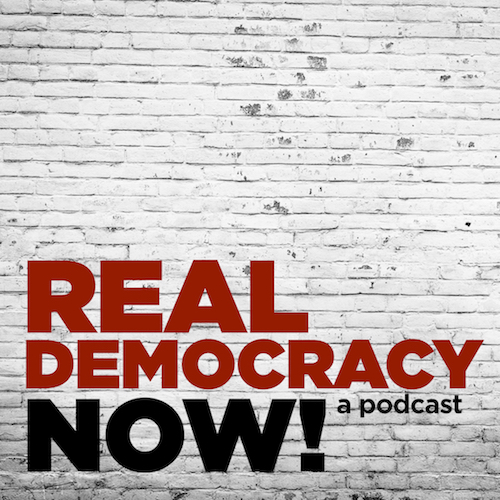Category: Podcasts
If you would like to read the transcript for this episode please click the link below:
If you would like a pdf of the transcript of this episode please click the link below:
- the origins of the Legislature by Lot workshop [1:32]
- the different ways to implement sortition (random selection) [3:54]
- some of the arguments in favour of a legislature selected by lot [5:44]
- different models of sortition [7:40]
- responding to criticisms of legislature by lot [10:11]
- how to design an oversight body to support a legislature selected by lot [14:10]
- the prospect of institutional change and transition strategies [18:34]
- moving the agenda of using sortition forward [23:43]
- how much work is happening around the world to test and promote the use of sortition [28:35]
- what representation and accountability means for bodies selected by sortition [30:29]
- deliberation, consensus, contention and voting [34:35 and 38:50]
- what the workshop agreed on [43:18]
- what might happen after the workshop: building links between researchers and practitioners [45:34]
- responses to critiques of empowered mini-publics [49:35]
- when the book arising from the workshop will be published [53:07]
| Provisional Schedule of Sessions
All sessions are in the Pyle Center, Room 225 The schedule shows the names of presenters attending the conference, not all the listed authors.
|
|
| Friday, September 15 | |
| 9:00 – 9:30 | Greeting & continental breakfast |
| Alternative Approaches | |
| 9:30-10:20 | Graham Smith, “The circumstances of sortition” |
| 10:30-11:20 | Andrea Fellicetti, “A bottom-up perspective on sortition as a means of democratization” |
| 11:30-12:20 | Jim Fishkin, “Random assemblies for law-making? Prospects and limits” |
| 12:30 – 1:45 | LUNCH |
| Contexts and Considerations for Implementation | |
| 1:45-2:35 | Arash Abizadeh, “Representation, bicameralism, and sortition: reconstituting the senate as a randomly selected Citizen Assembly” |
| 2:45-3:35 | Raphaël Kies, “A prudential path towards EU sortition and legitimacy” |
| 3:45-4:35 | Vincent Jacquet, Christoph Niessen, & Pierre-Etienne Vandamme, “Complementary virtues and competing legitimacies: Inter-chamber relationships in a bicameral elected and sortitioned legislature” |
| 4:45-5:35 | Lyn Carson [via Skype], “How to ensure that a randomly-selected legislative chamber functions successfully” |
| 7:00 | Dinner at Ichiban, 610 S Park St. |
|
Saturday, September 16 |
|
| 9:00-9:30 | Coffee, continental breakfast |
| The Larger Democratic Reform Agenda | |
| 9:30-10:20 | Ned Crosby, “Legislatures by lot in the context of major democratic reforms” |
| 10:30-11:20 | Yves Sintomer, “From deliberative to radical democracy? Sortition and politics in the 21th century” |
| 11:30-12:20 | Tom Malleson, “Radical democracy and the proposal for a legislature by lot” |
| 12:30-1:45 | LUNCH |
| Design Considerations | |
| 1:45-2:35 | Tom Arnold, “Lessons from the Irish Constitutional Convention, 2012-14” |
| 2:45-3:35 | Dimitri Courant, “Thinking sortition: Modes of selection, deliberative frameworks and democratic principles” |
| 3:45-4:35 | David Schecter, “How to design a sortition legislature?” |
| 7:00 | Dinner, Erik Wright’s house, 1101 Grant Street |
|
(cont on next page) Sunday, September 17 |
|
| 9:00-9:30 | Coffee, continental breakfast |
| Moving Beyond Electoral Accountability | |
| 9:30-10:20 | Brett Hennig, “On democratic representation and accountability” |
| 10:30-11:20 | Terrill Bouricius, “Why hybrid bicameralism is not right for sortition” |
| 11:30-12:20 | Campbell Wallace, “A ‘pure sortition’ proposal for democracy without elections” |
| 12:30 – 1:45 | LUNCH (perhaps sandwiches in the room?) |
| 1:45-3:00 | Open discussion and wrap-up |
Presenters
Andrea Felicetti
Arash Abizadeh
Brett Hennig
Campbell Wallace
Christoph Niessen
David Schecter
Dimitri Courant
Erik Olin Wright
Graham Smith
Jim Fishkin
John Pitseys
Lyn Carson (“Carson”)
Ned Crosby
Pierre-Etienne Vandamme
Raphaël Kies
Terrill Bouricius
Tom Arnold
Tom Malleson
Vincent Jacquet
Yves Sintomer
Attending but not writing a paper
Archon Fung
Jane Mansbridge
How do you approach comparing so many different approaches to electoral systems around the world? [4:20]
How do you characterise different families of electoral systems? [5.00]
Could you provide an overview of the key elements of different electoral systems? [6:00]
How can everyday people evaluate the different options? [15:05]
Are there electoral reforms that warrant serious consideration that are still only theoretical i.e. they haven’t been used anywhere? [20:25]
What do you think about the idea of using sortition to select a house of review? [22:15]
If you were asked to re-design the Irish electoral system what would it look like? [25:25]
